- Home
- Christie Golden
King's Man and Thief Page 6
King's Man and Thief Read online
Page 6
Drawing up a chair, Castyll eased himself down. The old piece of furniture did not creak in the slightest. He winced but a little as the chill wood touched his buttocks. Placing his broad palms on his thighs, Castyll stared at the candle, and concentrated.
When he had been three years old, he had been given the Test. Then, it had been simple: He had merely slipped his small child's arms into an adult-sized pair of arm bracers. Had he had the talent for magic, the bracers would have lit up with a warm, red hue. But nothing had happened, and all assumed that Castyll had, sadly, not been blessed with the talent for magic that graced so many of the Derlian kings.
But King Shahil hadn't accepted the ruling of the bracers, and he had encouraged Castyll to keep working, to keep learning, hoping that perhaps the talent would reveal itself later. One of the simplest tricks, Castyll knew, was lighting a candle using only the force of one's will. This would reveal the talent for either hand or mind magic. Mind magic would create the illusion of flame on the candle; hand magic would make the candle actually burn. The bracers were locked far away from his reach now. Only the candle remained.
He stared at it, as he had every night of his captivity, willing its blackened wick to spark to new life. And in that warm, soft glow of a single candle, Castyll's life would change forever. He would free himself and avenge his father's murder, ease tensions with Byrn, claim his birthright, and wed the Byrnian princess he so loved.
But the candle stayed dark. At last, his eyes filled with grit and aching with want of sleep, Castyll returned to his bed as stealthily as he had left it. He laid his dark head on the feather pillow and slept the sleep of exhausted youth. As he slept he dreamed of Princess Cimarys, uncrowned, her hair falling in an ebony cascade about her slim shoulders. She wore a flowing robe of fragile gossamer, and she smiled at him as she walked barefoot through an herb garden with the scent of the sea surrounding her.
CHAPTER FOUR
And Hope/Despair stood before him, but poor Tomai did not know which one he faced. The little boy Hope smiled reassuringly, but the old hag Despair leered. They held out the dagger and said, "There is but one place where you are sure to find the Tiger."
"Ah!" cried Tomai, his face pale. "So you would have me hunt the Tiger in his own lair? "
—Byrnian folk tale, Tomai and the Tiger
Braedon was an old city, one of the oldest in Byrn, existing by its present name and in similar incarnations for the better part of eight centuries. The name literally meant "place on the hill," and harkened back to a time when men had used the natural harbor and protective ring of surrounding mountains mainly as a defense against the Ghil. Trade had come later, after the more immediate struggle to eliminate the Ghil eventually drove the foul creatures ever northward, and humans rose in ascendancy.
Now the quiet natural harbor of centuries past was a bustling place of merchants and sailors, and those who made their living off of them. A few travelers, Damir among them, availed themselves of the perfectly serviceable road called Ocean's View that cut straight through Braedon and continued east through the mountains that protectively encircled the harbor city. The three ill-fated councilmen, brutally murdered by Bear and his cohorts, had been traveling along this road. But by far the greatest traffic in the city came by ship.
The worst parts of town were located "so near the water as t' be wet theyselves," as some of the inhabitants boasted. These were inns and taverns that catered to the needs of the often harsh men who did the actual sailing of the vessels. The farther east in Braedon one went, the better the environs grew. Continuing along Ocean's View, one passed the temples erected to the seven deities of Byrn and Mhar: Love, Light, Health, Traveler, Hope/Despair, Death, and Vengeance. Here, too, on a raised dais, were the stocks and, though not as often used, the gallows.
In the center of this area was a huge stone pillar called the Godstower. A single iron bell, over two hundred years old, hung from the top of the construct. The Godstower bell was rung seven times each day by the Blessers of each faith. Dawn was Light's time. Midmorning belonged to Love. Health's bell rang at midday. Traveler's Blesser pulled the rope in the afternoon. Twilight, that time of not quite day or night, belonged to the twin-countenanced Hope/Despair. Death sounded her knell when night was well on its way, and the middle of the darkness was Vengeance's domain. The gods lent their names, too, to the days of the week: Lisdae, Losdae, Healsdae, Trvsdae HoDesdae, Desdae, and Venedae.
Even farther down the road were the fine homes and more exclusive inns, gambling houses, and other forms of entertainment for the very well-to-do. Here, too, was the beautiful Garden, the pride and joy of the rich.
As Death's knell rang out on Travsdae, a scant five nights after the brutal murders of half the thieves of Braedon, the celebrants enjoying themselves in Deveren's lovely home paid the sound no mind. Deveren sipped honey wine from a gorgeous silver chalice and grinned to himself.
He enjoyed entertaining, and the pleasure never faded. There was little else, besides his beloved plays, that satisfied him as completely as hosting a gathering. The gentle, unobtrusive sounds of harp, flute, lute, and lyre; the happy buzz of good conversation; the glow on the guests' faces; the lavish spread of fine foods; the shrill punctuation of pleasant laughter—these intoxicated the handsome Lord Larath. People still talked about some of the parties he and Kastara had hosted, in their joyful, agonizingly brief time as husband and wife.
Deveren took another sip of the sweet fluid to hide the momentary flash of sorrow that flitted across his face. I still miss you so, my love, he thought. Regaining his composure, Deveren moved smoothly, inconspicuously, through the crowd of guests, making quiet notes as to who had attended and who was chatting with whom. His entire home was open and filled with light. Guests could wander anywhere and often did, from the dining hall where dinner had been held a few hours ago to the small armory just off the hall, from Deveren's beautifully decorated bedchamber to the tiny, romantic room atop the faux turret that adorned the house.
"Absolutely wonderful honey wine, Deveren!" came Pedric's voice at his ear. "Imported?" His host shook his head. "Only from down the street. When he's not pouring ale or serving terrible food, old Jankiss at the Cat and Dog makes this."
"Dear gods, you're joking!" Pedric stared with wonder at the goblet in his manicured hand. "You can get this at the Cat and Dog?"
Deveren laughed. "No, Jankiss makes it, but he doesn't serve it there. I pay him far better than any of his customers would."
"Sweet Love, I shall have to do what I can to undercut you and get some of this nectar myself," replied Pedric.
Deveren laughed, took another sip of the superb wine from lowly origins, and continued to peruse the room.
Damir, looking elegant in black hose and a short houppelande of royal blue, was deep in conversation with Lord Vandaris. Deveren smiled to himself. Though the celebration was allegedly being held in Damir's honor, Deveren's brother had eyes only for the man who could help him most—the white-haired, good-natured head of the Braedon Council. Deveren estimated that it wouldn't be long before Damir steered Vandaris into a less public corner for some more private political conversation. He was right; a moment later, Vandaris leaned over to his daughter to excuse himself.
"Good gods!" yelped Pedric, startling Deveren. "Who is that lovely creature?"
Deveren smiled to himself. "Won't Marrika be jealous?"
Pedric's handsome mouth contorted in a sneer of disgust. "The unlamented Marrika has been consigned to the pages of history, old friend. Now, tell me about this vision talking so affectionately to our dear councilman—" he stopped abruptly. "And don't tell me that she's his daughter!"
"Alas," said Deveren, mimicking Pedric's affected banter, "I must say that indeed the fair Lorinda is the child of our good Vandaris." His voice dropped, and there was no laughter in it now. "I'd steer clear of her if I were you. The last thing one of us wants to do is get messed up with a councilman's family—especially Vandaris."
&
nbsp; Clearly, Pedric had not heard him. He was staring, enraptured, at Vandaris's only child. And Deveren had to admit, there was much at which to stare. The young woman was tall, and her lustrous hair fell free about her shoulders. Most of her sisters in high society wore their hair either bound or piled atop their heads, laced with jewelry. Lorinda did not wear much jewelry at all. but her gown, though simple, draped her like the finest ornament. Her face was likewise bare, free of the often garish cosmetics that wealthy women used to color their lips, eyes, and mouth. Her skin was tanned, another departure from the current, milk-white fashion, and she seemed to like to laugh a great deal.
"I knew she'd been gone and had finally come home. Everybody knew that. But—" Pedric, for perhaps the first time in his life, was at a loss for words.
"She's been gone twelve years," Deveren explained. "Lorinda was sent at the age of eight to be one of the Tenders at Love's temple in Kasselton. When the former Blesser stepped down, she selected someone else to follow her as Blesser, so Lorinda returned home. This is the first time I've seen her make an appearance in public. Perhaps I should ask after her, see if she wants anything." He dead-panned this last line, and took a step toward the beautiful woman.
"Ah, no, Dev, I think I'll go convey your greetings for you." Pedric was moving before he had finished the sentence, and Deveren watched him go, worry in his hazel eyes.
So, thought Pedric as he stepped smoothly beside Lorinda, she's fresh out of the temple, eh? Shouldn't be too hard...
"Good evening, milady Lorinda. Welcome back to Braedon. I understand that you've just recently returned." He smiled charmingly. "Love's loss. I can tell just by looking at your fair face that you would have made a superb Blesser of Love."
He reached for her hand to kiss it, but somehow Lorinda managed to gracefully evade him. The look she shot him was decidedly cool. "Thank you for your welcome, milord ... ?"
"Pedric Dunsan, Lord Asakinn. But I'd like it if you'd call me Pedric." Again he tried for her hand, snared it this time, and brought it to his lips. It was surprisingly callused, but not unattractive. He attempted to turn it over, to place a feathery kiss on the sensitive wrist, when suddenly the workrough hand of the beauty of the hour wasn't there. He almost kissed his own hand, but recovered quickly.
"I'd prefer to keep things formal, Lord Asakinn."
Her voice was icy. If she was playing with him, she was doing it well. Mockingly, Pedric shivered. 'Trifle cold in here for early summer, don't you think? The winds usually blow," and he paused for effect, "warm and soft."
The brilliant dark eyes narrowed. "Excuse me."
She wasn't playing. She was serious. The realization unsettled him.
"No, wait!" The plea held none of the false calculation of his earlier chat, and Lorinda hesitated. Pedric swallowed. Her fragrance, a mixture of rose and honeysuckle, was devastating.
"I'm afraid I've made a bit of a fool of myself," he stammered. Her full lips twitched. She did not contradict him.
He took a deep breath. All or nothing, then.
Out it came. "All right: I think you're the most beautiful woman I've ever seen, despite the fact that you're not wearing any of those horrible cosmetics, or, I don't know, maybe because you're not wearing them, and I mean that, and I'm fascinated by the fact that you spent twelve years in Love's temple, and I think I'd truly like to get to know you better." He finished, and looked at her pleadingly.
"You look like a puppy," she said, but not unkindly.
His heart lifted, just a little, and the old playfulness returned in some small measure. "If I had a tail, I'd be thumping it on the floor, but I don't. I must content myself with looking pathetic and hoping my mistress will toss me a crumb of her affection."
Mirth played about her face, and finally she surrendered to it. She laughed easily, like a child, and Pedric felt his heart speed up at what merriment did to her already lovely visage.
"I'm afraid I owe you an apology," she said. Her voice, when warmed with friendliness, was music. "Ever since I've been back, I've been . .. well... almost attacked by young men who think that simply because I served the goddess Love I'm ready to sexually oblige anyone who asks."
Pedric blushed at her frank language. Never had he heard a woman —well, at least a woman of quality—speak so bluntly before. He also blushed at his own guilt. That had, of course, been exactly what he had thought.
While all the gods were honored in Byrn, Love was perhaps the favorite. Depicted as a naked little girl playing with a fawn, Love was the gentlest and most forgiving of the divinities. Her Blesser had a unique, and powerful, role. When young men reached the age of thirteen, they were sometimes called to Love's Blesser. She would be their instructor in the art of physical loving; to be selected by her was an honor. Like all the priests, Love's Blesser had attendants, known as Tenders. These children were selected from the better families to serve for twelve years. When they reached the age of twenty, a Tender would either be chosen to replace the Blesser as the new Blesser of the temple, or else her time of servitude had ended and she returned home. Pedric had assumed that a child used to being around so much sexual activity would have matured into a woman with "loose morals."
"Just because the act is familiar to me doesn't mean I have no reverence for it. The Tenders, you know, don't participate in the Rite of Initiation, just the Blesser. And it makes me furious that people would think ... !" Lorinda's tanned face flushed with anger and embarrassment. "It's— it's very difficult to come back to the world outside of the temple when you've been sheltered there so long, that's all. And I've probably offended you and I'll get a lecture from my father tonight."
Pedric shook his dark head. "No, you've not offended me," he said softly. "Far from it." He held up a finger, shook it, and in a lighter voice, he added, "Let me try this again."
He mockingly cleared his throat. "Welcome back to Braedon, milady Lorinda. My name is Pedric Dunsan. How may I help you enjoy your evening?"
Lorinda laughed, then matched Pedric's playful artifice with her own. "Ah, sirrah, I am quite parched. Might I have a sip of your wine?" She dropped the pretense and added innocently, "Papa said it was awfully good, but I haven't been able to get the server's attention."
'That I find hard to believe," said Pedric as he handed her the glass. She placed her lips where his had been and took a drink. In another woman, such a gesture would have been deliberate flirtation. Lorinda merely wanted a sip of wine.
The gesture was highly erotic, despite —no, because of— its lack of contrivance. Somewhere in the back of his mind, he knew that this woman was, in her own innocent fashion, far more dangerous than a thief with his knife, but he was utterly captivated. He had a dreadful suspicion that he was halfway in love with her already, and when she smiled and handed the goblet back, he surrendered utterly, and willingly fell the rest of the way.
In Deveren's library, Damir quietly pulled the heavy oak door closed behind him and turned to face Vandaris. A single lamp glowed on the small circular table. The table and two chairs, simply carved but functional and sturdy, were the only pieces of furniture, if one didn't include the massive bookcases that covered nearly every inch of bare wall. Deveren loved the smell and feel of books, but Damir wondered how much time his brother actually spent reading the books in his extensive library.
Vandaris seated himself and looked up expectantly. "Well?"
Damir put a thin finger to his lips. He went to the window and cursed silently. Deveren hadn't had time to replace the window he had damaged when Damir had shown up a few nights ago, and the small hole in the pane let in the sweet scent of the blooming Garden. It also would make it easy for an eavesdropper to have perfect access to the conversation. Well, it couldn't be helped. Damir glanced left and right into the darkness, trying to sense the thoughts of anyone present. He saw, and sensed, nobody and turned back to face the head councilman of Braedon.
"How much has Deveren told you about me?" he asked. He walked back to the other
end of the room, so that in order to watch him Vandaris would have to face the door, not the window. Damir had no desire to explain how that window had gotten broken.
Vandaris looked puzzled. "Your reputation precedes you, my lord. Your good brother hasn't had to say much. I'd venture to say that every lawman and councilman in Byrn knows of His Lordship Damir Larath, ambassador of His Majesty. You've got a bit of a nickname in the diplomatic circles, you know." His old eyes twinkled with mirth. 'They call you the Problem Solver."
Surprised and amused, Damir laughed aloud. "Do they really?"
"Mmmmm," affirmed Vandaris. 'They say that if only the king would send you, and not his armies, to confront the Ghil, you'd have a treaty signed within a week."
"Quite the compliment. And do you say that, Lord Vandaris?"
"I'm an old man, and I've seen a great deal in my day. I don't take the measure of a man by his reputation alone," Vandaris replied. "I like to see, and converse with, someone before I'll credit him with miracle making."
"No miracles, alas, but I do indeed solve problems."
"And what problem do you intend to solve here in Braedon?" Vandaris leaned back comfortably in the chair, but his eyes never left Damir's. "What problem is too big, or delicate, or dangerous, that we simple councilmen here can't handle it?"
Tread gently, Damir thought. Of course, Vandaris was wary. He assumed that Damir was in Braedon because of the recent murders. What a shock that must have been. Damir wondered how they were explaining it; probably as a tavern brawl that had gotten out of hand. The populace might not question that—as long as the exact number of bodies hadn't been made public.

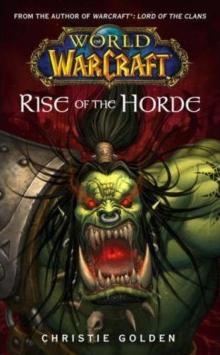 Rise of the Horde
Rise of the Horde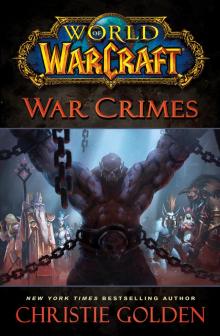 World of Warcraft: War Crimes
World of Warcraft: War Crimes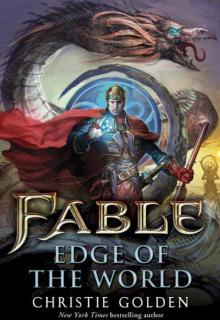 Fable: Edge of the World
Fable: Edge of the World Homecoming
Homecoming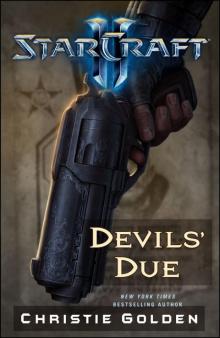 StarCraft II: Devil's Due
StarCraft II: Devil's Due Starcraft II: Flashpoint
Starcraft II: Flashpoint Allies
Allies Shadow Hunters
Shadow Hunters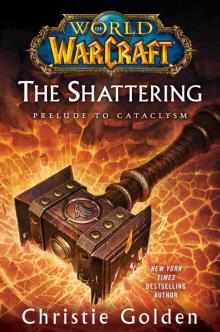 The Shattering: Prelude to Cataclysm wowct-1
The Shattering: Prelude to Cataclysm wowct-1 STAR TREK: VOY - Homecoming, Book Two - The Farther Shore
STAR TREK: VOY - Homecoming, Book Two - The Farther Shore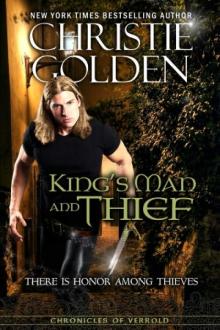 King's Man and Thief
King's Man and Thief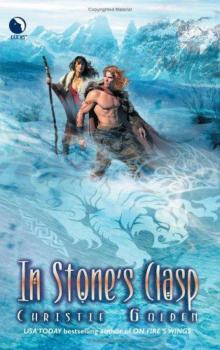 In Stone's Clasp
In Stone's Clasp Jaina Proudmoore: Tides of War
Jaina Proudmoore: Tides of War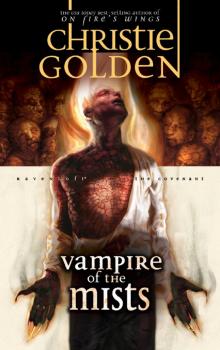 Vampire of the Mists
Vampire of the Mists Star Wars: Fate of the Jedi II: Omen
Star Wars: Fate of the Jedi II: Omen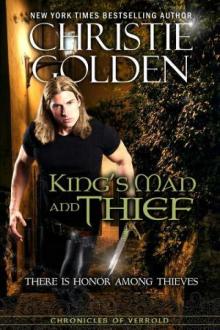 King's man and thief cov-2
King's man and thief cov-2 Star Trek
Star Trek StarCraft: Dark Templar: Twilight
StarCraft: Dark Templar: Twilight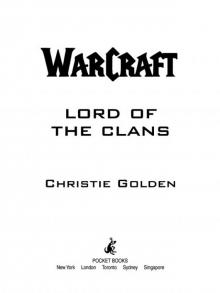 Lord Of The Clans
Lord Of The Clans ARKTIKA.1 (Short Story)
ARKTIKA.1 (Short Story) Before the Storm
Before the Storm STAR TREK: VOY - Homecoming, Book One
STAR TREK: VOY - Homecoming, Book One Shadow of Heaven
Shadow of Heaven Before the Storm (World of Warcraft)
Before the Storm (World of Warcraft) Warcraft Official Movie Novelization
Warcraft Official Movie Novelization Flashpoint
Flashpoint STAR TREK: The Original Series - The Last Roundup
STAR TREK: The Original Series - The Last Roundup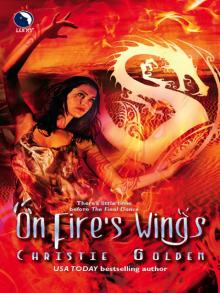 On Fire’s Wings
On Fire’s Wings Spirit Walk, Book One
Spirit Walk, Book One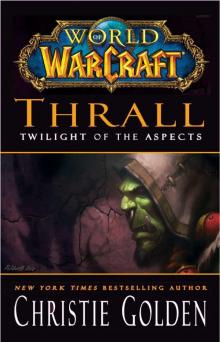 Thrall Twilight of the Aspects
Thrall Twilight of the Aspects Valerian and the City of a Thousand Planets
Valerian and the City of a Thousand Planets Warcraft
Warcraft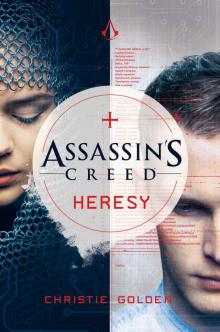 Assassin's Creed: Heresy
Assassin's Creed: Heresy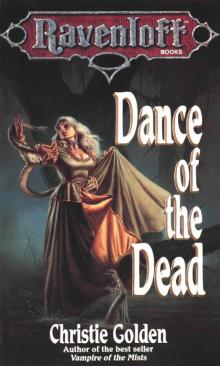 Dance of the Dead
Dance of the Dead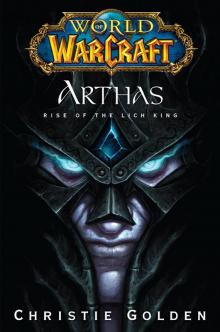 Arthas: Rise of the Lich King wow-6
Arthas: Rise of the Lich King wow-6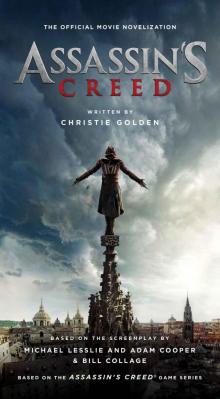 Assassin's Creed: The Official Movie Novelization
Assassin's Creed: The Official Movie Novelization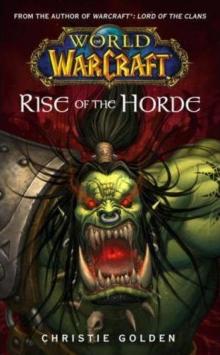 Rise of the Horde wow-2
Rise of the Horde wow-2 Dark Disciple
Dark Disciple Ghost Dance
Ghost Dance The Shattering
The Shattering Spirit Walk, Book Two
Spirit Walk, Book Two Star Wars: Fate of the Jedi: Ascension
Star Wars: Fate of the Jedi: Ascension Star Wars: Fate of the Jedi V: Allies
Star Wars: Fate of the Jedi V: Allies The Enemy Within
The Enemy Within Kindred Spirits
Kindred Spirits The Farther Shore
The Farther Shore Star Trek: Hard Crash (Star Trek: Starfleet Corps of Engineers Book 3)
Star Trek: Hard Crash (Star Trek: Starfleet Corps of Engineers Book 3) Twilight
Twilight